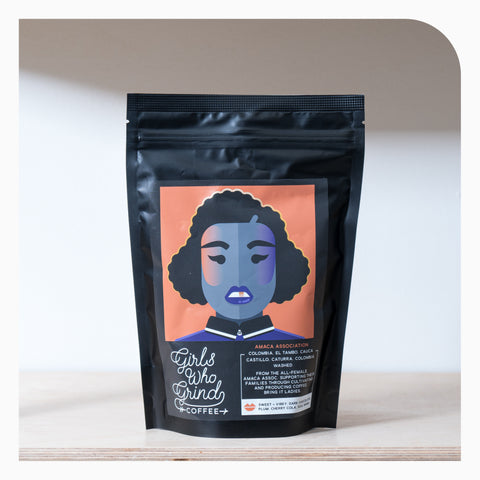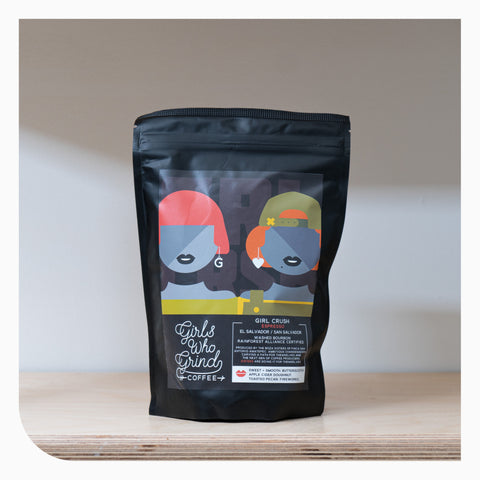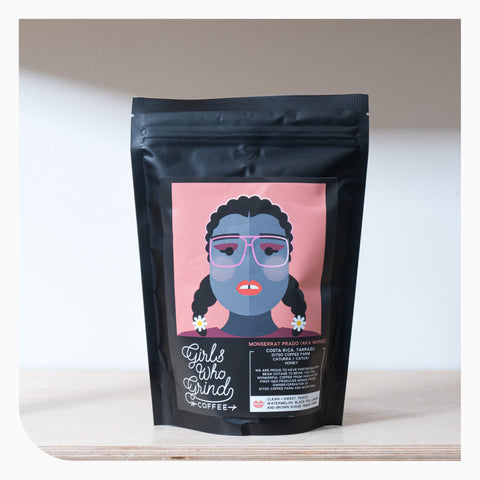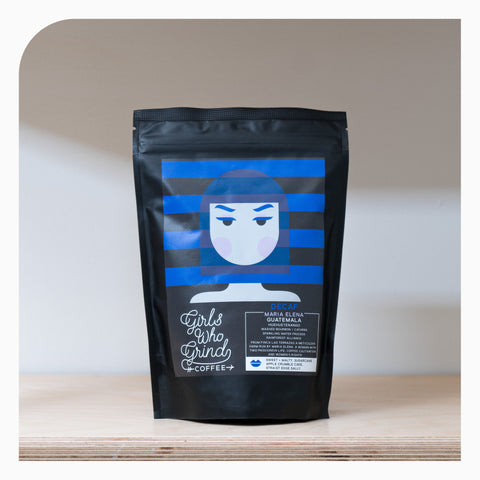Girls Who Grind Coffee are next up on our guest coffee roaster list, owned and run by Somerset based duo Fi Obrien and Casey Lalonde, (they're actually from Australia and the US but have now set up roots in the Southwest of England with their families).
Since 2017 the ladies have headed up an all Female small-batch roastery that leads the way in showcasing the talents and ambitions of women in coffee - by working with and sourcing all their coffee from female producers around the globe.

Each coffee producer GWGC work with has their very own powerful story of acceptance and innovation, also challenging the boundaries and social norms of women in the production of speciality grade coffee.
Nothing but kudos to the GWGC team for what they have set out to achieve.
Equally as compelling as the production of the coffee is the storytelling and branding that comes along with the coffee and the merch.
The coffee bags, in particular, are illustrated with striking and colourful portraits that are representative of the women that produced the coffee – what a fantastic idea!
We've got a lovely selection of unique female produced, source and roasted coffee on its way so have a read of what's to come up next.
First up we head over to South America for the Colombia AMACA - this is the first of many interesting stories.
AMACA (Asociación de Mujeres Productoras Agropecuarias del Cauca) is a group of all-women producers located in El Tambo, Cauca, Colombia. AMACA is 140 smallholder members strong, all women farm owners and heads of household - Impressive! A premium is paid to AMACA above the value of the coffee itself to support their goals and aspirations as a group. They have a simple ethos and mantra: to improve the quality of life for their members and their members’ families.
This washed Castillo Caturra variety is a sweet and vibrant cup, versatile enough for either espresso or filter coffee with the Tasting notes on this one pointing in the direction of rich dark chocolate, with balanced plum and a sweet ending of cherry cola.
Next, we have the Girl Crush El Salvador.
This washed process coffee is perfect for espresso-based drinks. Ideal for those with fancy coffee machines at home or you equally you get fantastic results from the stovetop Moka pot. The coffee is sweet and buttery pulling notes of apple cider doughnuts, butterscotch sauce and pecan nuts - guaranteeing that this is going to be an absolute tongue pleaser.
For those of you that are eco-aware, the farm in which this is grown (Finca San Antonio Amatepec) has been certified three times by the rainforest alliance – an excellent achievement by the trio of Boza sisters that run the farm. These ladies are ambitious change-makers looking to carve a path
for themselves and the next generation of coffee producers.
Moving south from El Salvador we have Costa Rica Monse.
This honey processed coffee is produced on the efficient and forward-thinking Monse Prado farm which boasts an innovative micro mill with a unique vertical design that has been certified by the local government for its efficient water and energy usage, an excellent example of lean milling processes if we ever did see one.
The coffee itself is wonderfully clean and sweet in the cup, with tasting notes of fresh peach and watermelon at the front, with brown sugar to finish.
With flavours like this, it is sure to be a staff and customer favourite.
The final string to our girls who grind coffee bow is a decaf.
This decaf is farmed by Maria Elena of Las Terrazas, Guatemala.
Maria Elena, a woman with two large passions in life: Coffee Cultivation and
women’s rights. Maria is heavily involved in the organisation International Women’s Coffee Alliance, which works to empower women in a male-dominated industry. Often, removing caffeine from coffee can be a complicated process that involves many chemical solvents - this coffee isn't decaffeinated that way, instead - the producers use an organic method which uses carbon dioxide, a completely natural resource, found in the air we breathe.
It’s also the gas that gives sparkling water its bubbles. This CO2 method of decaffeination is far better for the environment than using chemical solvents and it doesn’t leave any unnatural chemical residues; just lovely, fresh-tasting coffee.
This is one of the best-tasting decaf coffees we've had the pleasure to taste, expect sweet and malty tasting notes along with sugarcane and apple crumble cake.





